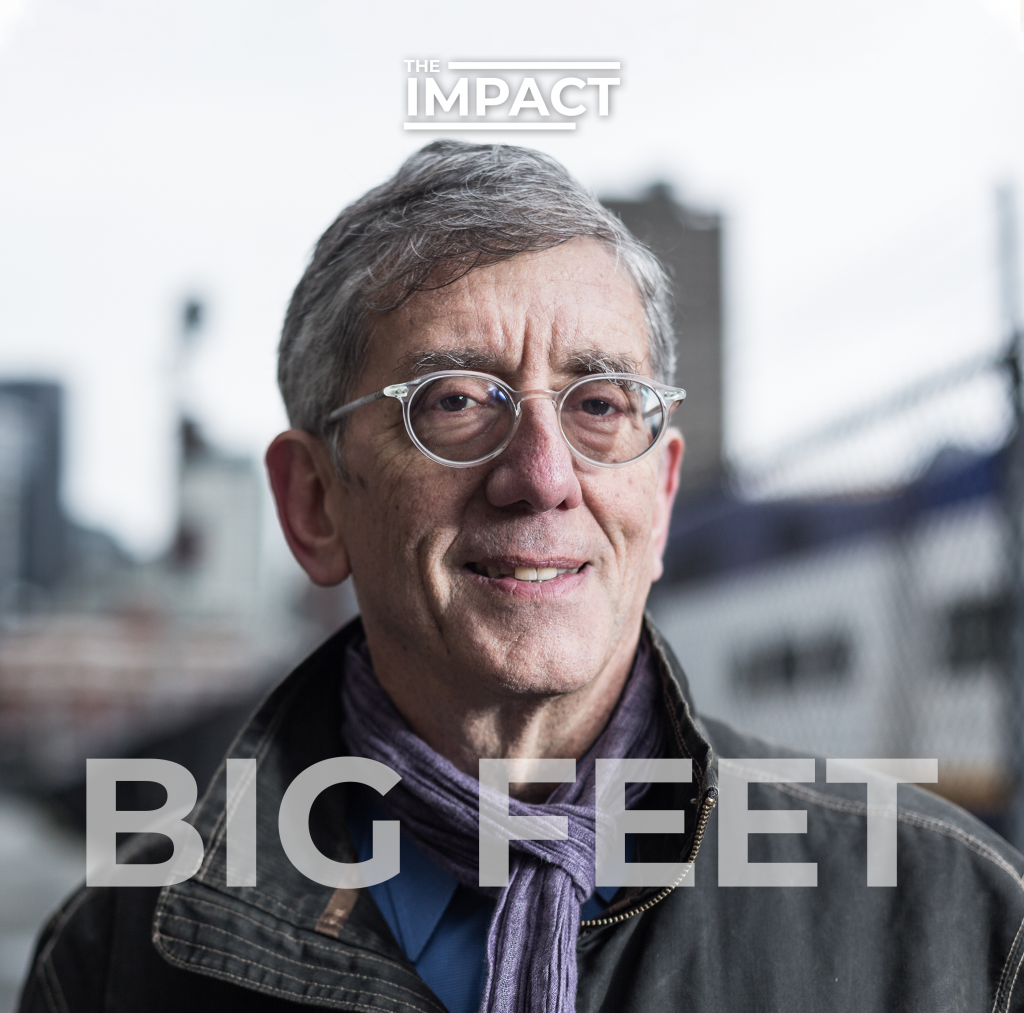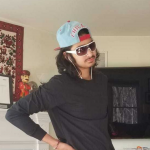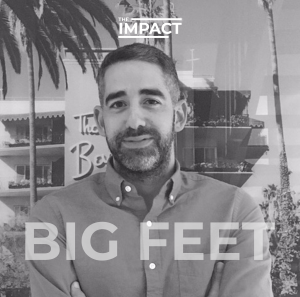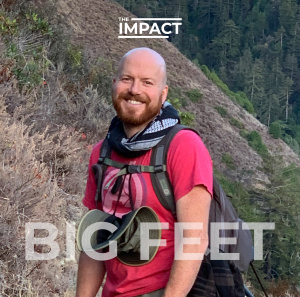Joel Soloman 0:00
Well, they’re there. Yeah, there’s a selfishness that that comes into play. You could say there’s an arrogance about it, which is we who are clever and got good education and had access to things and know how to, you know, build successful businesses and things like that have have forgotten the idea that if we don’t use that success, to take care of the stability of the entire society, that the results are not pretty. And so we’re going to we’re going to live through pretty serious period of that right now. Yeah, right now is a really great time for those of us that have benefited from big runs in the stock market. But whatever we did, you know, whatever we did, and we accumulated wealth and, and the ability to make choices. We’re the ones with the biggest obligation wherever we think we go when we breathe out. last breath, we better be ready for some scrutiny.
Ian Sumner 1:09
This week on big feet, we’re talking about power, purpose and capitalism and how to use these levers to create a more sustainable community country enrolled to help me out with that, Phil Solomon.
Hey, everyone, just a quick audience sidebar before we get into everything. This interview was recorded back in late March 2020. So any topics or ideas that are covered in it, like in the intro, for example, are prophetic, not reactionary. I know Joel would have a lot more to say specifically on what America is seeing now in June compared to just a few months ago. Anyway, onward.
Joel Soloman 1:53
I’m Joel Solomon. I live in Vancouver, British Columbia, Canada. I’m from Chattanooga, Tennessee, originally My life’s work became about how the powerful forces of business, money and finance could actually work for a better world and be conscious of its full cycle. So how does money affect the world? By my actions through my actions? I’ve written a book called The Clean money revolution, reinventing power, purpose and capitalism, that addresses some of the history of this kind of thinking, my personal journey, and lots of stories about entrepreneurs, organizations and people that have been part of bringing these questions to the forefront. And today, I’m co founder of an impact venture fund. We like to call it mission venture capital, and its name is renewal funds. We are now in our fourth fund. That means we go out and raise money from a with individuals, organizations, charitable foundations, wealth managers, government entities sometimes, and we invest that money into organic foods, non toxic households, and clean technologies in Canada and the United States. And we have several hundred investors around the world. We love what we do. And there’s a portfolio of companies on renewable funds.com. And you can look that up. And I hope you’ll take a look at my book, and I’m excited to talk to you That
Ian Sumner 3:37
sounds great. Um, I guess just to dive right into those three pillars that you have in your book of power, purpose and capitalism, how have you found that sort of like, what does this mean to you?
Joel Soloman 3:50
Well, I, for me, what that meant is power and who has it makes a huge influence on the world and There’s gigantic power, there’s human power, there are all kinds of different levels of power. It’s important that we assess what our power or influence is on the world around us. And we attempt to be conscious and make sure that it’s used for things that we believe in care about, and particularly for the well being of the long term future. purpose is, of course, that part about that we care. And we care about what we will look back on from our deathbed, we we care about future generations and our role in supporting a world that can be awesome for them. And we care about values we, we want to treat people well, we want to treat the rest of creation well, and we want to be good people basically. So that causes us to figure out what our purpose in life is and how to align our life with it the best that we can and then capitalism The system we live in. Today, around the world, it’s really hard to find anything other than that capitalism effectively refers to the exchange of goods and services. We are all consumers or exchanges of goods and services. Many of us, we work for companies that do that, or we create companies that do that. And it’s just part of the soup that we live in, the better that we understand it, how to influence it, and how to participate well in it, the more that we accomplish some of those goals that I mentioned and other goals that we may have as individuals.
Ian Sumner 5:37
And so I guess, part of what you’re doing the approach you’re taking in the capitalism sentence, right? Is you’re using, like, are you? How would you say you’re approaching? I mean, are you changing capitalism and the way it works? Are you kind of hijacking it for the greater good? Like how would you kind of describe it Your approach to that.
Joel Soloman 6:02
Okay, so yes, hijacking it for the greater good would be the starting place. It turns out that we do have a lot of influence over the money, at least that that we touch, or that comes through us. And we get to choose where to work. And we get to choose a lot of things. Those of us that are fortunate, those of us that can I just want to acknowledge at the beginning of the conversation, there are billions of people living on a very tiny amount of money, and they live at the will of our choices also. Hopefully, someday that will be a more level playing field. But it’s our job to understand where we that we live in a world like this where there’s an exchange of goods and services that goes on constantly all around us. 24 seven, we make choices. We decide where what who to bank with, how to invest money, if we have some savings, or we happen to made money and we have higher, higher amounts of wealth, and we make consumer choices and eat and we make all kinds of choices every day all day. My argument is, the more conscious we are about that, the better quality those choices will be. And if you combine that times millions of people, we can have a big impact on what the future looks like.
Ian Sumner 7:25
So I guess it’s kind of getting into the argument of like, vote with your dollars, right. That’s right. Yeah. So okay, so and I’ve, I’ve heard that argument sort of for a long time. And I mean, I’m not trying to be defeatist, but I mean, does it does it work?
Joel Soloman 7:42
We have seen so many improvements in the world, based on this kind of attention and intention. We, we as we discovered, that our choices affect the air we breathe the water we drink. The level of toxicities around us, many other people’s lives, etc. Over time, as we got more organized as civilizations, we started to make rules that govern the commons, we start to set rules about what is considered acceptable of how we treat the workplace and workers, how we deal with agricultural land, how we who gets what pieces of what we have taxation systems, we, we have a whole set of things that government decides we have a huge set of things that the private sector often does decide and influence. And then we as individuals are indeed making choices pretty much all day long every day. And we’re influencing our family and friends and the systems that we touch. So you could look at the environmental movement. You can look at the justice movement, peace movements, society. has evolved over time and citizen action and taking responsibility for certain things. We could get more specific about this, but it has driven a lot of these changes. Hmm.
Ian Sumner 9:11
I like that view on it. I mean, it means that we actually, as an individual can have an impact, obviously, those impacts when we influence other people, and we’re compounding and making it larger. Right? That’s right. How do I know I guess then, I mean, how do I know if it’s working? Right? So we’re talking about these big, complex systems. And I mean, I don’t know what my bank is doing with my money. They could be investing my savings into fossil fuels for all I know, I and I would never know, right? That’s right. That’s right.
Joel Soloman 9:50
I’m 65 years old when I was born, there were less than 3 billion people on this planet. We’re about to hit 8 billion. There’s no state There’s no end of that growth in sight. I, back in the 50s, when I started paying attention to anything. And then in the early 60s, they used to have things like the Good Housekeeping Seal of Approval. And you somehow believed that that told you that you were doing something better. These days, we have all kinds of organizations that do very serious science about determining better and worse in society. So you can disagree with these you can choose your own systems. I was born and diagnosed pretty early in life with a genetic kidney disease that my father’s lineage carried. And it basically was a deterioration of the kidney over time until it stopped functioning only in the kind of late part of his life and middle part of mine. did it become possible to actually receive a kidney from Someone else. So I, but but I didn’t that I went further in the story there just say the kidney transplant I finally had a transplant my friend gave me her kidney 12 years ago, everything went fantastically for both of us and we so far live happily ever after. But But I want to make the point that when I was faced with, okay, you could die from kidney failure and it could happen soon or you could live long, and there’s nothing you can really do about it. I resisted that diagnosis, because I started reading the labels on the packages of what I was buying to eat. And then what I was cleaning the house with, and then what I was putting in the air with my car and you go on from there, you start to get interested and you become curious about where things come from what influence they have on people in places. And so I look I’ve tried to find out what what is the kidney do well, it’s Its job is to clean the blood. Okay, I take a label from grocery store package, I look at it, I can’t understand what any of those chemicals are, I can see a couple of simpler ingredients that I sort of understand. And I start questioning what, what am I putting in my body? And why is it even okay for people to feed me this much less? You know, why am I making the choice? without really having knowledge about it? Am I damaging my kidneys. And so I concluded that what whatever information I could put together, that it probably made a difference, what went in my body, so I should make better choices that led me to be an organic foods investor, shopper, etc. And you kind of go from there and look at every part of the world that affects you and start to care. If this is damaging me, then how do I find a better way to do it? So that was the beginning.
Ian Sumner 12:52
Gotcha. And that is that I mean, it seems like the I mean, not only logical place to start, but the Guess the place where I mean I kind of where I’m starting and I guess where everyone is hopefully starting to are beginning to consider these things, but it just seems like I guess I guess the main, the big takeaway early is just start caring.
Joel Soloman 13:19
I think so. I think that caring is really the starting place. And religions have the job historically in spiritual practices, and families and schools and society. But let’s just start with the spiritual practices of giving us a sensibility about what life is, what it’s for, what what is being a good person mean. And most religions have some kind of afterlife that they talk about. You can interpret it how you want, but the message is Do unto others as you would have others do unto you or other forms of that kind of thinking in life. And though I saw many examples that convinced Meaning that we had lost that it started to give me some grounding to, to feel more empowered. And to think well, whether anybody else thinks this or not. I’ve got this situation I have choices to make, why don’t I make these choices rather than these other ones? Because maybe I’ll live longer. And maybe I’ll be happier, and I’ll feel better. So I think we all have that responsibility, and really an obligation to care about the unseen impacts of everything we do everything we purchase, etc.
Ian Sumner 14:36
I first off, I really like that. I think it’s a great approach. Um, I was watching one of your TED Talk speeches earlier and you use the term our name is on our money. Yes. Which I think is kind of getting into there as well. Right? That’s right. What’s the responsibility here?
Joel Soloman 14:56
Yeah. Well, once money comes to me once I’ve got one I hand on it, so to speak, whether that’s a symbol on a piece of paper or an actual piece of currency or a coin or something. I do like I like to think this way. And I encourage others to think this way, which is my name is on that money. And I would say that crypto and Bitcoin world and new technologies will not that long from now be able to track everywhere that that $1 bill circulated before. How did it get created originally? Was it digging something up out of the ground and selling it for more than it cost you to do it? Was it employing people and selling what they created for something more than it cost you to pay them and etc from there. So if you can simplify the economic system down to we purchase goods and services that represent extraction and concentration of the labor of people Or harvesting from the planet from the earth, something and then figuring out how to make a margin on it, and how to employ people to do it and how to do it more efficiently, efficiently, etc. And then someday we have now trillion dollar valuation companies. Back to the simple part of that. I take responsibility, that the way that I earn my money, the way that I hold money, like what where to put it in the bank or in a retirement fund or things like that. And then where I distribute my my dispose of my money or use it is actually something that fairly soon will be trackable, from birth to death, and our great grandchildren will know the choices that we made. And we might start to care about that. If we realize that there actually is a you know, a moral reason But moral and ethical responsibility that someday we may have to answer to, depending on your belief systems.
Ian Sumner 17:06
So you’re you take responsibility for your putting your visual or your theoretical, you’re putting your name on your money, right? You’re giving yourself the idea. And putting yourself in that sort of mindset of how you spend it really does matter. And,
Joel Soloman 17:21
yes. How imperfectly. Oh, sorry,
Ian Sumner 17:25
no, you’re good.
Joel Soloman 17:27
Well, it’s an it’s an imperfect process. But I still have an obligation to take responsibility for the choices.
Ian Sumner 17:35
Yeah, so how how, how far does that go?
Joel Soloman 17:41
Well, I tried to take it pretty far, but not but that’s not only am I a bit fanatical about it, and it’s part of my life work now. To do so managing money for other people and promising them that we’re going to do better with it then is how it’s going to be handled elsewhere. Not bad. And get a good financial return, we’re going to make positive choices that are less damaging, less, less harmful, and more generative. And we’re going to make you money. Well, we’ll find out whether all of that is really true and can hold up over the long term. Maybe that works today, because the powerful tend to have the rules written for them. And so you get a little extra advantage because of that, which leads to a responsibility for why you should only ignore politics at your peril. And you should understand how power works as well. But anyhow, back to the point. So this is a very high bar to put on oneself. And I feel like I make myself somewhat of a sacrificial lamb. I mean, you can pick apart, I can look around my house right now. And you can show me all kinds of things that have contradiction in them. Well, we don’t live in a world that makes it very easy for us. But what I think because it’s such a complex world today Is that we have a relative, we have a responsibility for the relative impacts of what we do. If you can figure out perfect then do that and write a book about it and talk on podcasts about it and help us out. And I think that we’re in a period where those of us committed to this. There’s a whole movement around these things. I will repeat again, they’re imperfect, yet we can do better. And we can do then better than that once we markets get built around this now, the organic food market when I got involved was a flaky, obscure unknown thing. You had to go to weird health food stores, you couldn’t understand the packaging or what the products work. Yeah, today. It is a major industry. And it’s still not 10% of the North American food dollar to get clean food. Huh. 90% of the food is still chemical laden and has all kinds of bad things in its cycle from from seed to stomach.
Ian Sumner 19:57
Yeah, I guess that’s where it starts. Just And I mean, I guess that’s the way to continue, right? If we just keep on doing the best we can, we’ll eventually get to a point where doing we’re, we’re doing net positive. And then we’ll upon going from there, right?
Joel Soloman 20:13
And the lucky ones of us do this as a life process anyway. Yeah. How, you know, you can, you can talk about dating, you can talk about parenting, you can talk about what you read, what you choose to do, how you spend your time, how you affect all kinds of things in society. And I’ve maintained this should be, this should be the moral and ethical teaching of spiritual traditions at the core, is to watch out for that. And that gives us a baseline to make choices with.
Ian Sumner 20:46
So as far as as a starting to make choices, and and and looking into a little bit more and just be more conscious of what I’m what I’m consuming, I think so. If you’re not Paying attention to politics or industry what you’re consuming, right then I guess you’re gonna get taken advantage of kind of right?
Joel Soloman 21:13
If you don’t care about electoral politics, care about the politics of what it’s what your community is like to live in. The the another politics that’s gotten very weird is the divide between how much a few of us can own and pay less taxes and get all the services. And how much can the masses earn less, end up paying higher taxes, ultimately, a lot of a lot of that is the reality of it, and get the worst and most damaging products because they’re the cheapest. And so this is just you, you either have a moral compass about these things, or you and your moral compass. is either aligned with, I’m looking out for the long term. I know many people that take an approach, which is I’m looking out for me, and I’m looking out for my immediate family. Okay, well, fair enough. If you believe that looking out for your immediate family, and your next generations is going to turn out okay, if you ignore all these other big picture things you know, you can’t there’s only so many ways to build walls and, you know, fight off everybody else that’s being bit taken advantage of so that you can have all the benefits. Yeah. So my politics are clear.
Ian Sumner 22:42
Part of part of part of caring is taking taking a look at the longer term, right. Capitalism. I don’t know it feels inherently sort of very short term and short sighted. Do you think? I mean, do you kind of agree with that Do Yeah,
Joel Soloman 23:01
I do I but here’s here’s my answer to that we should have progressive taxation. Those of us that are able to make more money should pay higher rate of taxes. Those of us that are laboring away in jobs that don’t pay very well should be given all kinds of social safety net and services to, to keep their lives together. Because we’re going to find out right now during this COVID crisis, what it means to have a massive amount of people with insecure employment on low wages, and have barely be barely able to hold on to their homes. And so now the government, we have united states government is about to pass close to $2 trillion of bailout, to spread money around to be sure and calm things so that chaos doesn’t ensue. It didn’t need to get that way. Yeah.
Ian Sumner 24:01
But I guess there was a there was a hope that that just wouldn’t or. But, I mean,
Joel Soloman 24:08
Yeah, there’s a selfishness that that comes into play. You could say there’s an arrogance about it, which is we who are clever and got good education’s and had access to things and know how to, you know, build successful businesses and things like that have have forgotten the idea that if we don’t use that success, to take care of the stability of the entire society, that the results are not pretty. And so we’re going to we’re going to live through pretty serious period of that right now.
Ian Sumner 24:45
Yeah. Heading back to sustainability a little bit as well. Do you think that we’re able to achieve sustainability through capitalism?
Joel Soloman 24:54
So it’s not capitalism, per se, in my mind is capitalism versus socialism? versus communism. Those are way too simplistic. I have concerns about dictatorships about fascism, about the those who have the most advantages, losing ourselves into greed and self indulgence and believing that we are actually smarter and better than everybody else. And that we deserve to have infinite wealth for ourselves. I think that’s a bad idea. And I think that people who are successful need to remember that. If you’ve got we got 8 billion people Pretty soon, seven and a half billion of those people are not going to tolerate a few of us having everything. Yeah. It’s just not just not, it’s not workable. Nor let’s let’s just throw climbers in here for a moment. And all of the environmental challenges facing us. species extinction, ocean warming, I mean, it goes on and on now, and, and science and all kinds of intelligent people are waving the flag of warning saying you got to get your act together people. And you got to do it. Now we’re almost out of time. I mean, they’re saying climate collapse, you know, is now in numbers. I hate to even repeat. It’s so short. But we’re going to see from this mobilization, so we’re throwing $2 trillion from American US government into subsidies to try to keep the system afloat. Well, where’s that $2 trillion to solve climate? climates is just is, is this serious? Is anything going on right now?
Ian Sumner 26:48
Yeah. So I guess the question is, I mean, can we do it without government? Well,
Joel Soloman 26:58
can we do without government I don’t think so. I think I mean, government is a result of our consciousness focus choices, how we operate, you know, we have all kinds of things. So these are very simple terms when boiled down to single words or a couple of words. But no, we need a regulator of the commons. There are major there’s major money being made all day long every day on damaging climate. We can make super efficient cars we can, we could be heating, we don’t need to be using oil products to heat our buildings. We have renewable energy advancing quickly. We got all kinds of solutions. But there are economic political choices that are underway, which bias the system. And most people don’t most of us don’t even understand how the system truly works. Yeah. How does legislation how And who influences it who gets to choose? So this is where you know, it’s an informed citizenry is dangerous to concentrated power.
I’ll just leave it at that.
Ian Sumner 28:15
So it comes back to power, purpose and capitalism. Well. Yeah, those are three good How to come full circle then.
Joel Soloman 28:22
Right. Fair enough.
Ian Sumner 28:24
Yeah. Um, so I guess just wrapping up what is sort of like your, your biggest takeaway that I should start doing now, and hopefully other listening should start doing now.
Joel Soloman 28:39
I think the biggest takeaway of the kind of day to day is really be conscious and make choices and keep making better choices and do the work to understand what that means for you. The bigger picture part of it is, we’re all going to face the deathbed if we’re lucky. I mean, we could die suddenly or something else could happen, but we’re going to Die. That’s one thing, pretty guaranteed still, we’re gonna die. And our job being alive has always been that we are ancestors of what’s coming. We’re ancestors of future generations. It’s our job to look after them.
Leave the best world that we can.
I’ve put my I’ve put my life into a zone, where I’m around the kinds of people who do think about those things. And I only shop it the kinds of places that I do trust, I try to bank with credit unions that actually have values and do something with their money in the local community. And don’t just ship it all over the world to the next, you know, quickest buck and and once you reach a certain point that you’re going to have to judge and that I have to judge for myself of a certain amount of athletes. I have that now. And I don’t need to keep piling up more and more money, unless I’m going to do something useful with it. And I mean for the world, yes, first family, personal family community, but communities the world. And if right now is a really great time for those of us that have they benefited from big runs in the stock market, but whatever we did, you know, whatever we did, and we accumulated wealth and, and the ability to make choices. We’re the ones with the biggest obligation. We’re gonna, you know, wherever we think we go, when we breathe our last breath, we better be ready for some scrutiny.
Ian Sumner 30:48
I mean, that seems like as good a place to end as any. Thank you so much for coming on. You’re welcome.
Joel Soloman 30:53
I really enjoyed it. Thanks so much for indulging me the time. It’s been fantastic.
Ian Sumner 31:04
Big fee is a production of the impact and produced by me Ian Sumner music genre. Check out our whole publication along with our other podcasts at read the impact.com. We’ll be back next week.
Transcribed by https://otter.ai





